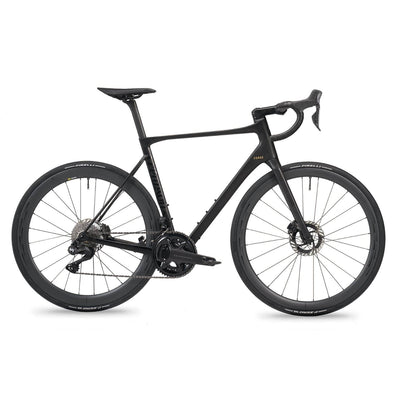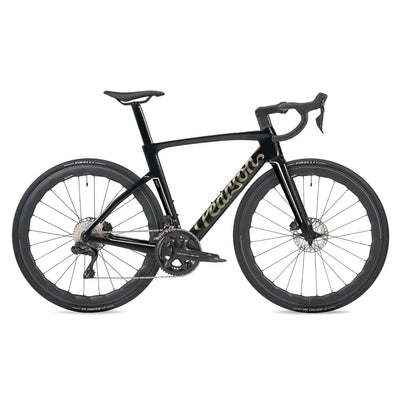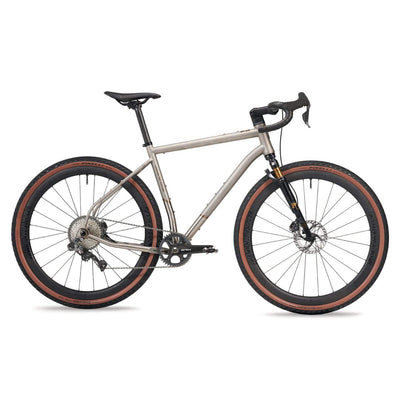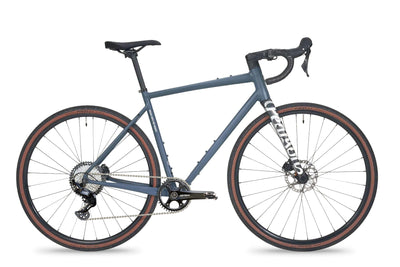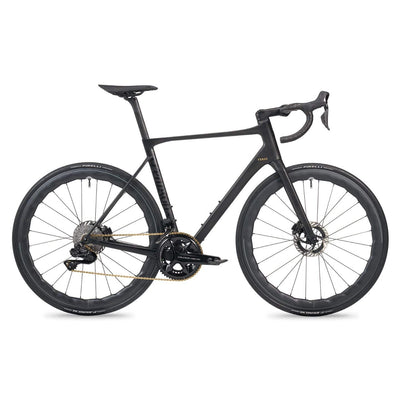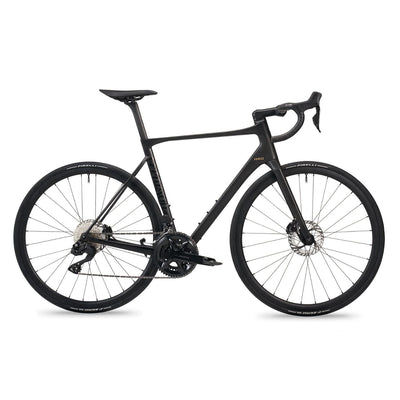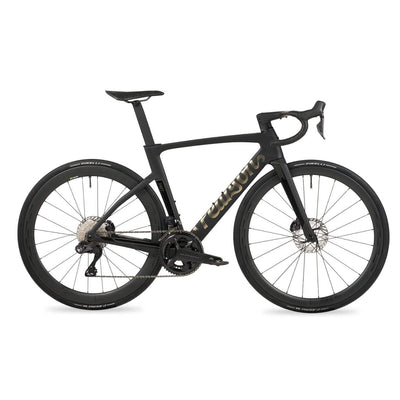Planes trains and automobiles. A guide to travelling with your bike.
It's that time of year when we set our sights on riding further afield. Here’s what you need to know about travelling with your bike.

Beyond the odd train and passport control strike, travelling with a bike either intact or packed, within the UK and abroad, is on the whole fairly straightforward, especially compared to those unpredictable times during Covid when it was more of a day to day guessing game.
In the UK you may find that you still need to book your bike on many services. If you’re planning to travel abroad, short of having your own helicopter, the obvious ways are by train, driving or flying. You can also take a bike overseas by ferry of course.
Here’s our run-down of the options.
Travel by ferry

Keep pedalling for long enough in the UK and you’ll hit water. Chances are there’ll be a ferry to get you across it. Most ferries have cycle parking areas on board, so you can just walk your bike aboard, park it up and head to the passenger areas. For short ferry journeys you might be able to stay with your bike.
The Isle of Wight makes a brilliant day trip from London, with a trip around the perimeter of the island only 65 miles. Roads are generally quiet, although surfacing is not always that great. It’s also easy to reach the Portsmouth ferry terminal from London by train and there’s a fast catamaran service to Ryde if you don’t want to take the drive on-drive off ferry.

The other place in the UK where ferries are a way of life is Scotland. There are loads of options to travel around and stay on the islands and a bike is a great way to explore, as most islands are quite compact and have less traffic than the mainland, although there’s often not the network of back roads to get you off A-roads. If you’re really up for some island hopping, there’s a fantastic looking 122km route in western Scotland that takes in the Isles of Arran and Bute and five ferry crossings.
Calmac ferries to the Scottish islands and Wightlink to the Isle of Wight carry bikes free of charge, although it’s worth checking if you need to book if you’re taking a popular service at a busy time.
If you want to head abroad, P&O Ferries will take bikes along with a foot passenger booking. There’s a marked cycle route into their ferry terminals, then you just queue up in the designated lane, stow you bike on the car deck and head to the passenger areas. Eurotunnel’s cycle service from Folkestone to Calais is also a great way to take advantage of a high speed crossing from £35.
There’s some surprisingly good cycling country south east of Calais with rolling hills and quiet roads, so it’s not a bad destination for a weekend excursion. You can always take a train from Calais to Lille and onwards if you want to combat the cobbles of Paris-Roubaix or the classic Flemish bergs around Oudenaarde.
Travel by train

Within the UK, train travel with a complete bike is free, although for some services you’ll need a reservation and bikes aren’t allowed on some trains at specific times, particularly for travel into London. It’s worth checking on Plusbike on the National Rail website to see what the specific rules are for your planned trip.
The alternative is to box or bag your bike. We’ve more on bike boxes below, but since you’re going to be responsible for getting your bike onto and off the train and stowing it during the journey, you might feel comfortable with a lighter weight, less padded bike bag that you can carry around rather than full-strength bike luggage that you’re going to need to wheel through the station and lift onto a train.
If LEJOG is on your radar this year, getting to Land’s End by train is fairly easy. You need to reserve a space for your bike and there’s a limited number available, so it’s worth booking early.
Getting back from John O’Groats is a bit more tricky. You can book a bike taxi transfer to Inverness. If you want to take the train, the nearest station are Wick or Thurso and you need to reserve a slot. With short trains and limited service, there’s not much capacity and you’ll probably want to leave yourself some contingency to make sure you don’t miss your slot. After that, you’ll need another reservation to get back south from Inverness.
If you’re looking to travel further afield by train, your options are relatively limited. You can book bike boxes on to Eurostar, although you can still take a folding bike in a bag on a carriage.

Photo by Phil McIver
It’s worth noting that Paris, like London, has multiple rail termini, so if you wanted to travel further you’d need to get your bike across Paris. You’re allowed to take a bike on the RER fast metro lines outside peak hours - it’s two stops to the Gare de Lyon for main services south of Paris, while the Gare de l’Est is adjacent to Gare du Nord. For TGV services to the west of France you need Gare Montparnasse, which isn’t served directly by the RER.
Boxed bikes travel for free on TGV services and without reservation, if they’re within specified dimensions; assembled bikes need to be booked and there’s a supplement payable, although it’s a maximum of €10. There are different rules depending on the service, which are explained here.
Onward travel from Brussels is easier, as domestic and international services depart from Bruxelles Midi, the station where Eurostar arrives. You can take your bike on Belgian trains by paying a €4 supplement, although you can’t book and may need to take the next train if all the cycle slots on a service are taken. A packed bike is treated as hand luggage.
Travel by plane

So if you want to take your bike to Europe, either driving or flying are currently the principal options. If you’re planning to travel further afield, including to popular destinations for training camps like the Canaries and Mallorca, then flying is the only realistic option. That means you’re going to need to box up your bike for the flight and you’ll pay a supplement for carriage. With Easyjet that’s £45 if booked in advance, Ryanair charges £60. If all your bags add up to under 23kg and your boxed bike is under the dimensions it specifies British Airways will carry a bike for free, otherwise it’s £65.
Airport baggage handlers are notoriously heavy-handed with luggage, so you’re going to need an industrial strength bike bag or bike box to give your bike a fighting chance on a plane. The last thing you want is to find that something’s been damaged and you spend the start of your holiday chasing around for a repair or parts.
We sell the Evoc Road Bike Bag Pro. It’s designed to fit a road bike, with only the wheels and pedals needing to be removed and comes with extra padding to protect the bars and levers and other more fragile parts. It’s also collapsible so it doesn’t take up too much room when not in use.
A bike bag that gives a high level of protection is quite an expensive purchase, so If you don’t plan to use it regularly and don’t want to buy a bag we can also rent you one - simply call our Sheen store and enquire.
Or just hire a bike when you arrive
It’s also worth looking into options to hire a bike at your destination. In big centres for cycling like Mallorca, there are companies who will rent you a bike for your stay and some hotels have rental bike fleets too. Options will often include top spec models from big brands, they’ll usually be almost new and you won’t have to worry about maintenance.
For those of you heading to France for some alpine climbs, the team over at Buzz Performance in Morzine have a fleet of Pearson Hammerandtongs available for you to hire, as well as offering some comprehensive training plans for those of you that want to get the most out of your time away.
If Italy is on your radar, it’s worth checking out ItalyBikeHotels.com, a collection of hotels across the country which offer facilities geared to cyclists like a secure bike room, guided and self-guided tours, bike hire and a sag wagon. Or if you’re looking for a deluxe experience, InGamba is hard to beat.
Wishing you happy travels!
Treat yourself to a new bike day >
3 comments
When I did the end to end last year I arrived at JOG during the rail strike so my reservation was pointless. I just carried on cycling to Wick and then to Inverness next day. It meant I ended with two 115 miles days. I then picked up a car in Inverness and drove back to Evesham. One way hire was quicker and cheaper than train or plane. Probably not much slower too when you take into account the extra hassle of getting to and from train stations. If you were sharing better still.
The ferry from Harwich to the Hook of Holland is also a good cross-Channel route as you can be quickly onto quiet roads and multiple cycle tracks throughout Holland.
Trains to London from Wick or Thurso can be hit and miss. I’ve booked the ferry from JoG to Orkney then the overnight ferry from Kirkwall to Aberdeen, which hopefully means I’ll get 7 hours sleep!

